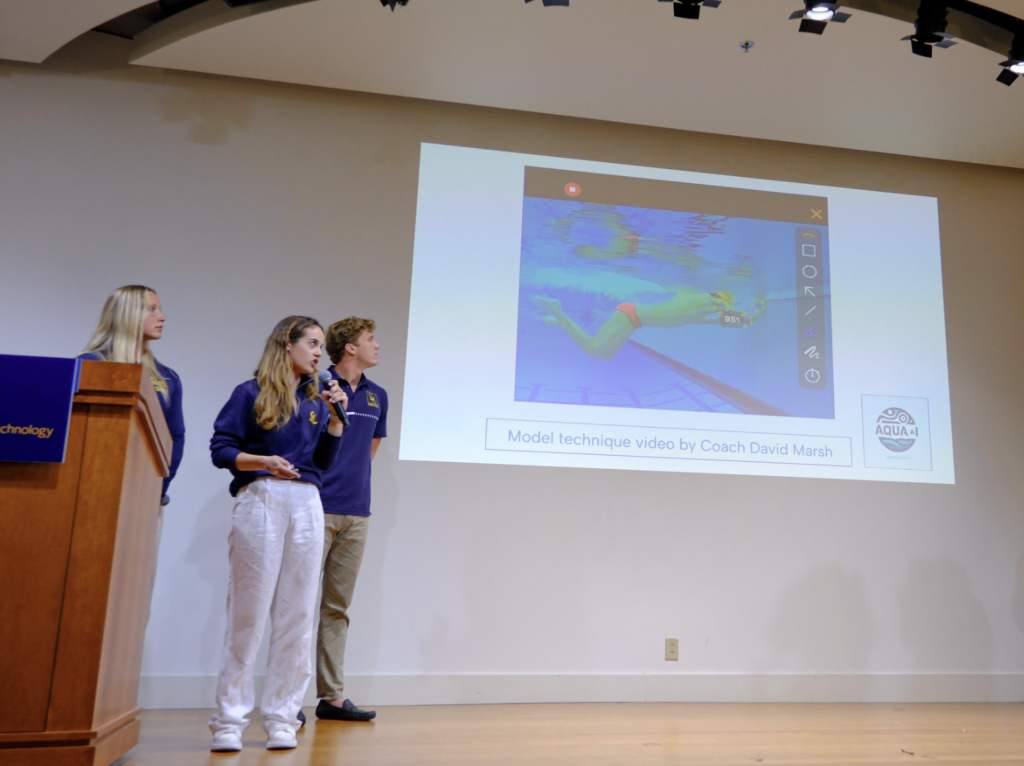Solving swimming: Aqua AI founder Peyton McQueen makes waves

Adam Lau/Berkeley Engineering
Collider Cup XIV finalist Peyton McQueen first got the idea for her groundbreaking product, Aqua AI, from a podcast.
“Someone described Cal [as] having perfected the ‘formula’, referring to the way in which training is given to swimmers,” McQueen explained. “This immediately opened my eyes to how almost every aspect of swimming is dictated by math — amount of yardage, intervals, stroke count, the physics of an efficient stroke.”
Once McQueen discovered that swimming follows a mathematical formula, she realized there must be a perfect ‘solution’ that swimmers can train towards. Eager to explore this idea, she began recruiting data science interns to research the potential of AI in swimming, backed with her own lifetime experience as a swimmer and team manager.
“Swimming is a sport where your head’s in the water. It’s all about feel,” McQueen said. “What I provide for the swimmers almost every single day [as a manager] is film. Me and a handful of interns will film them above water and underwater, and then it is uploaded to a Google drive and meticulously organized so that it’s very easy for them to see their progress.”
It was through this footage that McQueen began to test video analysis technology for the Cal swim team. Within a year, she decided to take the product’s success even further with SCET.
“When I started the Sports Tech class this past spring, it enlightened me to see a real marketable business that would combine what I’ve already done for the [Cal] team and also progress the sport of swimming as a whole,” McQueen reflected. “Going to the Collider Cup, I got to see how this concept resonated with investors, including outside the swimming community. With the development of the model after that, we can produce unimaginable changes in the sport as a whole.”
McQueen stated that marketing her product to a wider audience is a key hurdle to clear before Aqua AI can grow further.
“If the product is going to distract the coach from the work that needs to be done, they’re not going to use it,” she said. “Creating something that would transition smoothly into their own program is what we’re looking for, and what [the Sports Tech class] helped me to formulate.”
But before expanding the company, McQueen wants to focus this summer on improving the product itself with the help of Cal’s swim team.
“I want to solidify the research and choose an investor that is going to be right for us,” she said. “We’re also still building our team. The beauty of the Cal swim team is that not only am I surrounded by the best athletes in the world, but they chose Cal because it is such a prestigious academic institution and they have minds that are just as brilliant. I’m talking to swimmers with backgrounds in engineering and computer science. I’m also working with Coach David Marsh on the swim side of things — he has been my most important mentor throughout my college career and my life.”
Along with Marsh, McQueen mentioned startup expert Mark Searle as a mentor who is currently helping Aqua AI grow. She plans to take Searle’s SCET course “Startup Catalyst: Let’s Speed Up Your Startup” this fall.
Another resource McQueen expressed gratitude for was the Sports Tech class, where she worked to pitch and market Aqua AI with her class team: Tommy Roder (’26), Forrest Frazier (’24), Hank Rivers (’26), Colby Hatton (’26), Isabelle Stadden (’24), Ashlyn Fiorilli (’24), Emily Gantriis (’24) and Stephanie Salesky (’24).
Through SportsTech, McQueen picked up new skills and gained experienced mentors.
“The Sports Tech class is a unique place that combined so many of my interests,” McQueen said. “There are tons of athletes and tech entrepreneurs in the class, which is a very special combination of people with direct perspectives who can create something that we know people in the sports industry will use. I am extremely grateful for all of the advisors I have been connected to — my professor from the class, Christyna Serrano and advisor, Peter Evans — in learning to organize a business model.”
McQueen believes that the strongest reason behind the class’s success is the ever-growing potential for the revolutionary future of sports technology.
“We’re in a country where sports is heavily celebrated,” she said, referencing the U.S. Olympic team as an example. “Sports itself is really exciting, and with the development of AI, I can’t imagine what’s next. It’s easy for people to get excited about something that’s entertainment as well. In another sense, sports tech is so exciting because athletes and people like me know exactly how to market sports. We translate our passion for sports into a passion for business.”
And it’s this passion that propels both McQueen and her team towards excellence. According to McQueen, the attitude of a swim team is just as essential to their success as their technical skill.
“Aqua AI, while it can provide the meticulous formula needed to train swimmers at the elite level, cannot replace a coach because I’ve learned that team culture is needed alongside a perfect training formula,” she said. “The culture at Cal is what sets us apart. The passion and attitude of the swimmers and coaches, combined with this seamless mathematical formula.”
Looking toward the future of her product, McQueen is grateful to be immersed in Berkeley’s culture of both technological and athletic ambition.
“It’s a blessing being so close to such great resources,” she said. “As I said, swimming is a form of math. When I translate this formula using my platform, my biggest dream is that the sport of swimming can be solved.”
